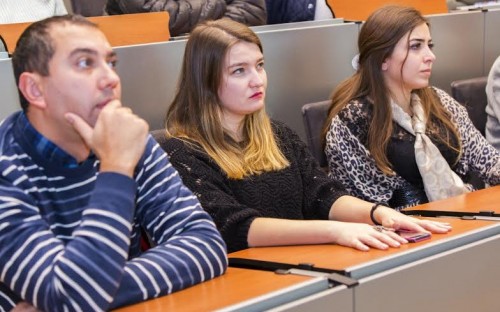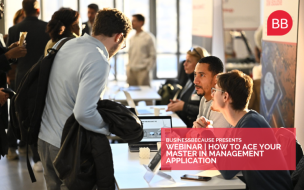The first intakes in 2015 and 2016 were 100% international, with 20 high-potential students of 15 different nationalities coming from all over the world to stay in the historic Dutch school’s on-campus accommodation.
Why? “It’s a fast-track to managerial roles,” explains Laura Ipacs, academic coordinator for the Master in Management program. “Our graduates start at a higher position than they would have started without it.”
With scholarships available to international students based on their country of origin, Maastricht attracts young professionals from emerging markets in Eastern Europe, Central and South-East Asia in particular.
Throughout the Master in Management program, students are supported by a dedicated career service as well as workshops – on soft skills, interview techniques, resume writing, inter-cultural communication and teamwork - held by practicing professionals. Afterwards, international students are better-qualified and better-positioned to attain a working visa for the EU.
Yet the majority of the first cohort returned to their native countries, motivated by the need to generate social impact and drive development back home.
“Having a cutting-edge international education gives them a major advantage in their home countries,” Laura explains. “With the English language, communication, technical and management skills that they acquire here, they can make a really big difference.”
The program’s syllabus is revised each semester to best reflect the real-life working environment. As well as the latest hot topics in tech – digital technology and big data – students are introduced to business and statistics software and data analytics tools.
Ethics and sustainable business practices are embedded throughout the curriculum. The intimate class size means individual attention. And students gain exclusive insight with behind-the-scenes visits to high-profile companies like Dutch tech giant Philips.
For Azerbaijani graduate Aynur Alishli (pictured left), it was a life-changing experience: “MSM is not just a school; it’s a place where I felt at home, in a huge family. That is the core difference which resulted in unforgettable memories for me.”
Fellow countryman and former classmate Farid Nuriyev (pictured below) agrees: “It was exciting studying in an international group with people of different cultures,” he says. “I’ve improved my managerial knowledge and skills.”
The one-year, pre-experience program requires a bachelor’s degree from a recognized university and proficiency in English. A 600+ GMAT or GRE score is preferred, but not essential.
At €15,500/$17,300, the Master in Management is a cheaper than Maastricht’s full-time MBA, at €28, 500/$32,000. But the programs are complementary, with Master in Management grads likely to be fast-tracked in the MBA course.
Whatever the program, students at Maastricht profit from the school’s global outlook and unique location at the very heart of Europe. In Maastricht, you can walk or cycle everywhere, but you can also jump on a train and reach five different countries within an hour.
“Our strategy is to be international,” says Laura, originally from Hungary. “We have lots of different partnerships all over the globe. We teach according to an international curriculum. Our faculty come from all over the world, and they’ve taught all over the world.
“[And] Maastricht is a very special place,” she continues. “You get a diversity of experience here, that’s difficult to get elsewhere.”
The Master in Management has starting dates in January and September of each year. Visit the program page of the Master in Management program for more information about the curriculum, admission requirements and scholarship possibilities.
RECAPTHA :
a1
36
81
35











